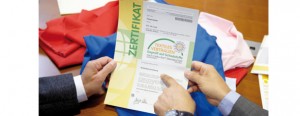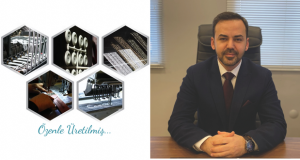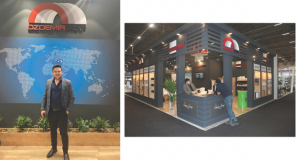 Internal quality management and control mechanisms from the OEKO-TEX® Association to ensure compliance with the stipulated criteria
Internal quality management and control mechanisms from the OEKO-TEX® Association to ensure compliance with the stipulated criteria
Zurich – Since 1992, OEKO-TEX® has supplied brands, manufacturers and retailers with an extensive product portfolio providing targeted support for companies implementing human-ecological product safety and sustainable production conditions. The concept behind the individual certifications/services and their subsequent further development are based on three central requirements: They are available worldwide and applicable at every stage of production in the textile chain, optimally tailored to the needs of the textile industry and adhere to the principle of continuously improving any achievements that are already in place. To ensure compliance with the necessary criteria is achieved in practice, OEKO-TEX® operates an extensive quality management system and inspection policy that actively demands operational responsibility on the part of the participating companies and covers a wide range of internal processes. The 16 OEKO-TEX® member institutes are highly specialized organizations with comprehensive expertise in every area of the textile sector, and in most cases have decades of experience in research and textile quality testing. All of the OEKO-TEX® institutes have received accreditation for their independent testing departments and their competence in accordance with ISO 17025. This common basis and ethical policy alone are enough to ensure that all of the test results achieved and audit assessments carried out are standardized and consistent.
OEKO-TEX® Standard 100 Test criteria and a consistent testing level
The criteria for harmful substance testing based on the OEKO-TEX® Standard 100 are reviewed on a yearly basis and adjusted as necessary to comply with new laws and scientific findings in order to increase consumer safety. The requirements are binding for all certification processes worldwide and the laboratory tests are carried out based on the same methodology in every OEKO-TEX® institute. To ensure consistent test results, the member institutes carry out regular round robin tests among themselves and must pass internal audits carried out by experts from other OEKO-TEX® institutes. Regular training from the OEKO-TEX® laboratory and audit teams also contribute to a consistently high testing and knowledge level. Technical experts from each OEKO-TEX® institute meet twice yearly to exchange experiences relating to the certification procedures carried out and research work for substances and testing methods as well as to discuss new requirements. This approach has helped the participating OEKO-TEX® institutes to establish a well-founded basis for the further development of the criteria catalogue. All OEKO-TEX® laboratory tests are also subject to a material-specific test system and are carried out exclusively in member institutes in Europe and Japan that have been authorized by OEKO-TEX®, ensuring that the assessments of the textile samples are always correct and objective in every standard procedure, including first-time certifications, certificate renewals and upgrades and control tests.
Quality management audits
To help integrate the required test criteria into production to the greatest extent possible, on-site company audits form a mandatory part of first-time certification in accordance with the OEKO-TEX® Standard 100. Company audits are then repeated in three-year cycles. At present, more than 3,500 quality management audits are carried out each year. In 2013/2014, for instance, there were 3,587 company visits in 69 countries worldwide. From these visits, only 16 companies failed to pass the audit, a rate of less than 0.5%.
Product controls
For a number of years now, OEKO-TEX® has also carried out systematic product controls on a minimum of 25% of the certificates issued each year. As part of these controls, random samples of products marked with the “Confidence in Textiles” label are purchased from retailers and subjected to another laboratory test. For preliminary and intermediate stage textile products, samples are taken during production as part of the company audit and analyzed by the responsible OEKO-TEX® institute. The control tests are supplemented with unannounced company visits by auditors from the OEKO-TEX® Association, especially in the case of facilities in countries of production where there have been complaints regarding product conformity. These companies are also subject to a further audit. Positive findings from the control tests are assessed by OEKO-TEX® on both a country-specific and criteria-specific basis, and any anomalies are analyzed to ascertain their development. The introduction of across-the-board obligatory quality audits and the gradual increase in product controls (originally 15% of the issued certificates, then 20% and now 25% at minimum) have seen a significant reduction in the rate of objected test parameters in recent years. Furthermore, our last appraisal from 2013/2014, involving 17,611 control tests carried out on items from 32 different product groups and 3,309 verified certificates from 61 countries, also highlights the fact that the overwhelming majority of the objected parameters were human-ecologically less critical test parameters such as compliance with color fastness levels or the pH value.
Protection against misuse
Another cornerstone of OEKO-TEX® quality assurance is protection of trademark laws and forgery-proof documentation. Thanks to a 2D bar code, each OEKO-TEX® certificate (including any related certifications for individual components) can be fully traced by the OEKO-TEX® Association in a central register containing all of the existing certificates, ensuring that any freeloaders or frauds supplying incorrect documents are easy to detect. The newly developed MySTeP by OEKO-TEX® database also lets registered users from industry and retail to validate and manage the OEKO-TEX® certifications (OEKO-TEX® Standard 100, STeP by OEKO-TEX®) of their suppliers in a credible manner. For any potential misuse (such as falsified labels, etc.), OEKO-TEX® employs its own expert who pursues any detected violations at an international level so that legal steps can be initiated against the perpetrators as required. In terms of brand protection, the attentiveness of companies with OEKO-TEX® certification and the public is also not underestimated. For instance, an interactive validity check that is available on the OEKO-TEX® website serves as a helpful tool for all companies (including retailers) and consumers. By entering the certificate number or test number provided on the OEKO-TEX® label, you can view whether the certification is valid and read a detailed description of the certified item, including information about the OEKO-TEX® product class to which the item belongs. If any discrepancies are revealed, the affected companies and consumers are asked to contact an OEKO-TEX® representative immediately. This QM area is completed with the provision of comprehensive data protection for all of the technical/database systems required to support our customers.
STeP by OEKO-TEX®
Production facilities that receive certification in accordance with STeP by OEKO-TEX® for their environmentally friendly and socially responsible manufacturing conditions are audited by the responsible OEKO-TEX® institute for the first time once the online assessment is complete and before the certificate is issued. After that, regular conformity audits are carried out on all STeP facilities, as well as additional unannounced audits of companies that could reach only level 1 of the 3-level STeP scoring system used for the assessment. If any deviations regarding compliance with the required sustainability criteria are detected during these subsequent audits, the STeP certificate may be revoked.
 SleepTech Magazine Mattress, Accessories, Machinery, Raw Materials
SleepTech Magazine Mattress, Accessories, Machinery, Raw Materials


